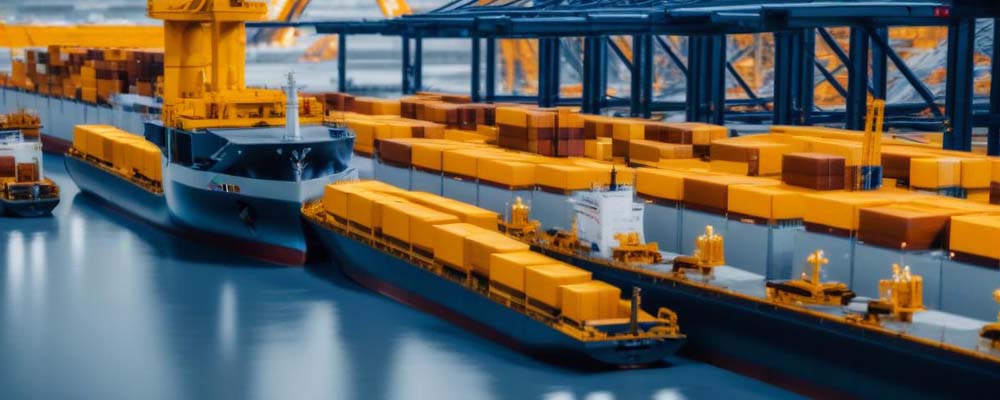
Exporting to France opens up a world of opportunities for businesses across various sectors. Understanding the intricacies of French trade can help you gain a significant edge in the market. This blog post will guide you through the major ports in France and highlight the top imports, offering valuable insights to streamline your operations and ensure compliance with French import regulations.
Why Export to France?
France is one of Europe’s largest economies, making it a vital trading partner on the continent. The country’s strategic location and developed infrastructure make it a gateway to the broader European market. Exporting to France not only opens doors to this significant market but also provides the potential for expanding into neighboring countries.
Understanding French Trade Infrastructure
France boasts a robust trade infrastructure that supports seamless import and export activities. The nation’s extensive network of ports, railways, and highways ensures that goods can be transported efficiently across the country and beyond. Knowing the key components of this infrastructure is crucial for optimizing your logistics strategy.
The Importance of French Ports in Trade
French ports play a pivotal role in international trade, serving as key entry points for goods entering Europe. The country’s ports are equipped with state-of-the-art facilities that handle a wide range of cargo types, from containers to bulk goods. Understanding the major ports and their specialties can help you choose the best point of entry for your products.
Major Ports in France
France has several major ports that facilitate international trade. Each of these ports has unique strengths and caters to different types of cargo, making them vital components of the country’s trade ecosystem.
Port of Marseille
The Port of Marseille is the largest port in France and one of the most significant in the Mediterranean. It handles a diverse range of cargo, including containers, liquid bulk, and dry bulk. The port’s extensive facilities and strategic location make it a preferred choice for many exporters.
Port of Le Havre
Located on the northern coast of France, the Port of Le Havre is the country’s second-largest port. It is a key gateway for goods entering the European market and is particularly well-known for its container handling capabilities. The port is well-connected to the rest of Europe, making it an excellent option for exporters targeting the continent.
Port of Dunkirk
The Port of Dunkirk is another major player in French trade, particularly for bulk goods. It is the third-largest port in France and has specialized facilities for handling grain, coal, and other bulk commodities. The port’s proximity to Belgium and the Netherlands adds to its strategic importance.
Popular Imports to France
Understanding what products are in demand in France can help exporters tailor their offerings to meet market needs. Several categories of goods are consistently popular among French importers.
 Machinery and Equipment
Machinery and Equipment
Machinery and equipment are among the top imports to France. This category includes industrial machinery, electrical equipment, and mechanical appliances. Exporters of high-quality, innovative machinery have significant opportunities in the French market.
Pharmaceuticals
France has a well-developed healthcare system, driving demand for pharmaceuticals and medical supplies. Exporters of pharmaceuticals can find a receptive market in France, provided they meet the country’s stringent regulatory standards.
Consumer Goods
Consumer goods, including electronics, clothing, and household items, are also popular imports. The French market values quality and innovation, so exporters offering unique, high-quality consumer goods stand to gain a competitive advantage.
Navigating French Import Regulations
Compliance with French import regulations is crucial for a smooth export process. Understanding the requirements and obtaining the necessary certifications can help prevent delays and avoid penalties.
 Customs Procedures
Customs Procedures
France follows EU customs regulations, which means that goods imported into France are subject to the same rules as those imported into other EU countries. Familiarizing yourself with these procedures can help streamline the import process.
Documentation Requirements
Proper documentation is essential for importing goods into France. Key documents include the commercial invoice, packing list, bill of lading, and certificates of origin. Ensuring that all documentation is accurate and complete can prevent delays at customs.
Tariffs and Duties
Import tariffs and duties vary depending on the type of goods being imported. It’s important to understand the specific tariffs applicable to your products and factor them into your pricing strategy. Using tools like the EU’s TARIC database can help determine the correct duties.
Leveraging Technology for Efficient Trade
Technology plays a crucial role in modern trade, and leveraging the right tools can significantly enhance efficiency. From digital documentation to real-time tracking, there are several technologies that can benefit exporters.
Digital Platforms
Digital platforms can streamline various aspects of the export process, from documentation to communication with partners. Platforms like TradeLens and Infor Nexus provide comprehensive solutions for managing trade operations.
 Real-Time Tracking
Real-Time Tracking
Real-time tracking technology allows exporters to monitor the status of their shipments at all times. This can help identify and address any issues promptly, ensuring that goods reach their destination on time.
Automated Compliance
Automated compliance tools can help exporters ensure that their shipments meet all regulatory requirements. These tools can automate the documentation process, reducing the risk of errors and speeding up the import process.
Building Strong Partnerships
Strong partnerships are essential for successful international trade. Building relationships with reliable freight forwarders, customs brokers, and local distributors can help ensure a smooth export process.
Choosing the Right Partners
Choosing the right partners is crucial for success in international trade. Look for partners with a proven track record, strong industry knowledge, and the ability to meet your specific needs. Partnering with local experts can also help navigate the complexities of the French market.
Long-Term Collaboration
Long-term collaboration with trusted partners can lead to more efficient operations and better outcomes. Establishing strong relationships based on trust and mutual benefit can help both parties grow and succeed in the international market.
Understanding Cultural Differences
Cultural differences can impact business interactions, and understanding these differences can help build stronger relationships with French partners. Being aware of cultural nuances and demonstrating respect for local customs can enhance your business dealings.
Sustainable Trade Practices
Sustainability is becoming increasingly important in international trade. Adopting sustainable practices can not only help protect the environment but also enhance your brand’s reputation and appeal to eco-conscious consumers.
 Conclusion
Conclusion
Exporting to France offers numerous opportunities for businesses willing to invest in understanding the market and navigating its complexities. By leveraging the country’s robust trade infrastructure, complying with import regulations, and building strong partnerships, exporters can successfully tap into the French market. For more personalized advice and support, consider booking a consultation with our team of experts. We’re here to help you succeed in your international trade endeavors.




 Machinery and Equipment
Machinery and Equipment Customs Procedures
Customs Procedures Conclusion
Conclusion



